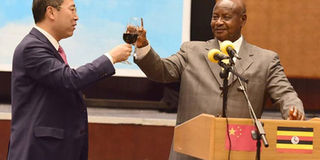Prime
China hands over satellite TV project to Uganda government

Chinese Ambassador to Uganda, Mr. Zheng Zhuqiang {left} toast a drink with President Yoweri Museveni in remembrance of the good relationship between China and Uganda.
What you need to know:
- The project, which was implemented by Star Times under the supervision of the Chinese Embassy in Kampala and ICT Ministry, was started last year in July.
KAMPALA. The Chinese government has completed a digital television project that will see more than 500 villages across Uganda access digital television.
The project, code-named Access to Satellite TV for 10,000 African Villages, is among the 10 major programmes supported by China.
Speaking at the handover ceremony, Speaker of Parliament Rebecca Kadaga, said the project is important given that it gives Ugandans access to information.
“Villagers will be able to access information on agricultural markets. It will also help government to improve education standards, she said.
The project, which was implemented by Star Times under the supervision of the Chinese Embassy in Kampala and ICT Ministry, was started last year in July.
Ms Zheng Xiu Fen, the Chinese Embassy economic counsellor, who represented the Chinese ambassador, said Uganda had had more than 56 years of trade relations, which has seen a lot of projects brought to life.
“[This is] the third biggest project in Uganda after the agriculture and emergence food. China aid is meant to improve standards of living of Ugandans,” she said.
The Access to Satellite TV for 10,000 African Villages is a China-Africa cooperation project that seeks to reduce the information divide by offering digital TV in rural areas.
Mr Charles Lwanga, who represented the ICT Ministry, asked China to extend the programme other areas that are yet to be covered because it was a good way through which development can be mobilised.
Mr Andy Wang, the StarTimes chief executive officer, said the project has installed viewing gadgets mainly in public viewing centres such as schools, health centres and community centres with the view of helping people have unrestricted access to information.




